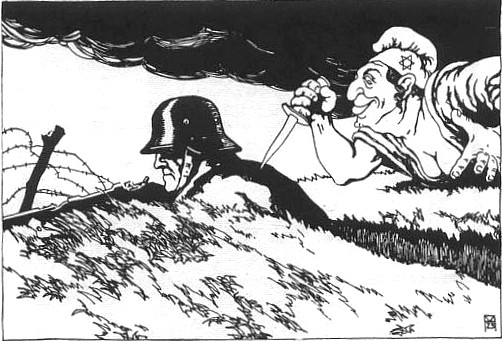
Wednesday, November 11
Was Trump stabbed in the back? Did he actually win the election, only to have his victory stolen away by traitorous slime—including some turncoat Republican officeholders?
Let me ask you another question: Did Germany actually win World War I—only to have that triumph snatched away by a secretive cabal of Jews, anti-monarchist opponents of Kaiser Bill, and agents of the British Empire?
It’s pretty much the same scenario at work. Who can say just how deluded MAGA man might be—but he and his enablers sense that, whatever the outcome this time, they have in the past profited from proclamations of outraged victimhood—just as the Nazis profited in the aftermath of WWI.
Get ready for “fraud at the polls” and “stolen election” to become the bywords of GOP fanatics and Fox News commentators for years to come. Evidence? “We don’ need to show you no stinking badges!” A large number of Americans already feel victimized and are eager to shout from the rooftops a shared sense of outrage with the Big Orange man.
A Morning Consult survey conducted over the weekend found that seven out of 10 Republicans now doubt that the 2020 election was “free and fair.”
Prior to the election, 68 percent of GOP voters said they had at least some trust in the U.S. election system. Post-election, that dropped to 34 percent.
It’s not just the everyday wackos. In Georgia, the two Republican senators, both of whom face runoff elections shortly, have called for the resignation of the Republican secretary of state, who they imply presided over a corrupt election process.
Even more vociferous howling has taken place where the election officials happen to be Democrats. In Pennsylvania, the GOP leadership of the state legislature has called for the secretary of state, Kathy Boockvar, to resign.
And in Wisconsin and Michigan, legislators are forming investigative committees and issuing subpoenas to search out “election irregularities.”
Trump himself seems focused on Nevada and Pennsylvania.
Recounts of ballots now cast won’t do much for the GOP. The former GOP Wisconsin governor, Scott Walker, has pointed out that election recounts may differ from the first vote by no more than a few hundred votes—not the thousands needed by Trump to overturn the presidential election.
So what? If Trump can’t get a reversal of the vote count, his peals of protest can probably win him a new slot on television or a megabucks book deal. Why not both? Ripped Off can command the No. 1 spot on the failing New York Times best-seller list and mega-sales at crooked Jeff Bezos’ amazon.com.
Dinner: Avgolemono soup and a salad.
Entertainment: More of our marathon viewing of As Time Goes By on Britbox.

